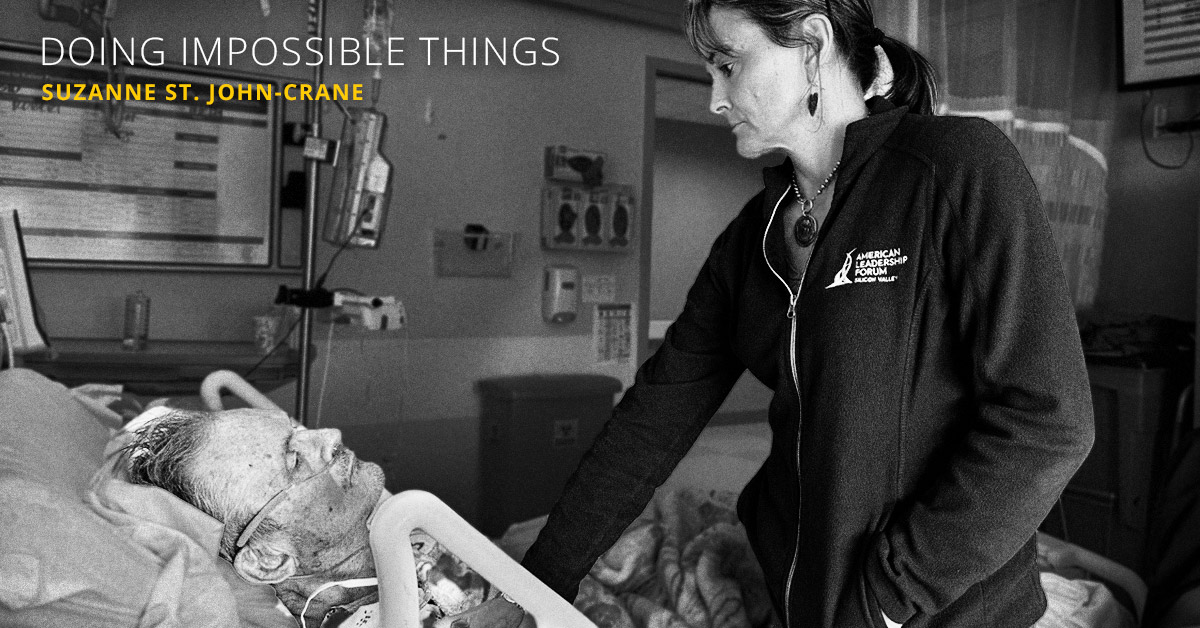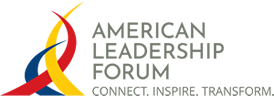
Doing Impossible Things
“I don’t know why I’m still here. I thought I would have transitioned by now.” My 85-year-old dad shared his frustration with me as he lay in bed two weeks ago, struggling to do many of the daily tasks of living anymore—like eating, walking, breathing, remembering things.
I rested on the foot of his bed, a little weary from daily caregiving these last several months. “God isn’t ready for you yet, Pops. And maybe you still have things left to teach me,” I responded.
And teach me he did.
Dad asked me to take the lead on all of his healthcare and life decisions. I watched this proud, incredibly stubborn man who, when he could manage to stand up, towered over me at 6 feet tall. He knew how to assert authority, and before my eyes, was learning how to let it go. I deeply felt his trust in me to know how and when to make the next move. The honor of that responsibility brings with it so many lessons.
In ALF, we use Otto Scharmer’s Theory U framework to describe how we might move through problem-solving in a deeper, more holistic way. It requires getting comfortable with the unknown. Sitting at the “bottom of the U” and paying a new kind of attention to our senses—in particular, our gut and heart sense. Dad regularly reminded me, in the midst of all of the challenges that were thrown at us, that we can “decide not to decide” today. We can wait for more information to present itself, for divine intervention, or for the universe to illuminate the next steps. But in order to hear those directions, we have to activate our capacity to listen deeply.
“He taught me how to let go of my unrealistic expectations, and lean into his wishes. This wasn’t my journey. It was his.”
Having the presence of mind to see the whole field of possibilities, the clarity to sense what is right, and the courage to take action comes through working the muscle of mindfulness on a daily basis. Deeply observing and feeling all that life offers while keeping your finger on the pulse of how to care for yourself and others. Not letting your reserve get too empty, and knowing when to step away to refuel.
“How did you sleep last night?” He would always ask me. “Don’t let yourself get too tired.” He knew the load I was carrying.
Practice grace and forgiveness—that’s another lesson he taught me on this journey. Letting go of our imperfections, knowing that life is messy and despite our best efforts, we will fall short sometimes. I found myself getting frustrated when he wouldn’t do his PT exercises or took his medication too early. We wrestled with each other like a mother and child would. He taught me how to let go of my unrealistic expectations and lean into his wishes. This wasn’t my journey. It was his.
The journey led us to Kaiser Hospital in Santa Clara last week, where I met Dr. Smita Gavaskar. Her leadership showed me new depths of compassion and an uncanny ability to see people deeply. She told me exactly what would happen with clarity and love, and gave me permission to let go. “You’ve been doing this for so long. You don’t have to do this anymore.” How did she know? I had just met her. She used all of her senses and knew how to deeply listen. She had an uncanny knowing.
Dr. Gavaskar then brought me snacks, a soda, and apple juice. Sometimes, all you need is a juice box to feel loved.
“I’m grateful that through the ALF experience, we have the gift of knowing people deeply—including ourselves.”
Leadership can look like tireless advocacy. Fighting for medication increases, more comfort care, medi-cal, housing and IHSS to come through. This journey may move me to work towards systems change. To take what Dad and I experienced together and make things better for the greater good. The Silver Tsunami is coming—an aging population that will need caregiving and can’t afford $10k+ / month assisted living facilities. Why doesn’t Medicare cover Board and Care homes at $4-6k / month? Leadership is questioning systems and being part of solutions. My ALF classmate Jennifer Loving, CEO of Destination: Home, reminded me that senior citizens represent a significant portion of the unhoused here in Santa Clara County. I now understand why. This is immoral, unconscionable, and solvable.
In our recent election check-in with the Co-Founders of Civity, Palma Strand invited those attending to think of our depth of interactions with people on a scale of one to ten. “We’re usually at a 1 or a 2 with people. I want you to move to a two and a half or three today.” I looked around the Zoom room and in our office at folks attending, and several shared my smile. “Palma, I need to tell you that as ALFers, we’re already at a five.”
I’m grateful that through the ALF experience, we have the gift of knowing people deeply—including ourselves. It allowed me to be completely present through my dad’s journey and know when to stand up and lead or step back and trust others, much like a healthy network does. In the end, my job was to follow his lead.
I’ve been a witness to his lifelong struggles, his recovery, and his final letting go. To fully realize our humanity is to love someone—and ourselves—through it all.
—Suzanne
Robert Roger St. John
November 16, 1938 – October 17, 2024
